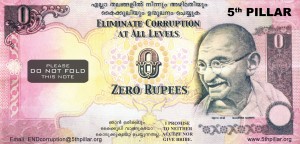I thought it right to write a post describing what Jan Lokpal Bill is and why is it needed. To give a brief history, Lokpal Bill was first introduced in parliament in 1968. It has been brought in parliament on eight times on later occasions, but has never been passed by the parliament. It is a bill that is supposed to give powers to citizens to sue the people responsible for corruption. A similar kind of independent agency disappeared corruption from Hong Kong a few decades ago.
The government is again thinking of introducing a Lokpal Bill in parliament this year, and the National Advisory Council (NAC) chaired by Sonia Gandhi is considering it. But as it stands today, the bill is riddled with loopholes, defeating its very purpose. Social activists have remarked it to be a toothless bill and not at all acceptable. An alternative bill, the Jan Lokpal Bill has been drafted by Justice Santosh Hegde (Lokayukta of Karnataka), Prashant Bhushan and Arvind Kejriwal after series of consultations with public and social activists. This bill is supported by Kiran Bedi, Shanti Bhushan, Anna Hazare, etc.
The Dandi March 2 event and the subsequent ‘fast unto death’ by Anna Hazare from April 5 and Aug 16 were in support of this ‘Jan Lokpal Bill’. The activists have already sent the bill to the PM and all CMs but there has been no response. After the ‘fast unto death’ was announced by Anna Hazare, he was invited for talks by the PM, but the response was bad as the PM said the government has no time for corruption till May 13. This after the numerous corruption scams like the Commonwealth Games, Adarsh Society, 2G scam being uncovered in the past months.
The present system to fight corruption in India can be described in some points as below –
- The Anti Corruption Branch and CBI comes under the government. Despite having evidence, it is very difficult to convict people as they have to take permission from the same bosses, against whom the case has to be investigated.
- No corrupt officer is dismissed from the job because Central Vigilance Commission, which is supposed to dismiss corrupt officers, is only an advisory body. Whenever it advises government to dismiss any senior corrupt officer, its advice is never implemented.
- No action is taken against corrupt judges because permission is required from the Chief Justice of India to even register an FIR against corrupt judges
- The functioning of CBI and vigilance departments is secret and hence it promotes corruption.
- Weak and corrupt people are appointed as heads of these institutions by the government.
- Citizens face harassment in government offices. Sometimes they are forced to pay bribes. One can only complaint to senior officers. No action is taken on complaints because senior officers also get their cut.
- Nothing in law to recover ill gotten wealth. A corrupt person can come out of jail and enjoy that money.
- Small punishment for corruption- Punishment for corruption is minimum 6 months and maximum 7 years.
As you can see, in the present system, there is no deterrent for any public official to engage in an act of corruption. Some of the salient features of the Jan Lokpal Bill are –
- An institution called LOKPAL in the centre and LOKAYUKTA in each state will be set up. These institutions will completely independent of the governments, just like the Supreme Court and the Election Commission. No minister can influence their investigations.
- Investigation in any case will have to be completed in one year. Trial should be completed in next one year so that the corrupt officer, or politician goes to jail in two years max.
- The loss that a corrupt person caused to the government will be recovered at the time of conviction.
- If any work of any citizen is not done in prescribed time in any government office, Lokpal will impose financial penalty on guilty officers, which will be given as compensation to the complainant. So, you could approach Lokpal if your ration card or passport or voter card is not being made or if police is not registering your case or any other work is not being done in prescribed time. Lokpal will have to get it done in a month’s time.
- Election of Lokpal officials – What if government appoint corrupt and weak people as Lokpal members? That won’t be possible because its members will be selected by judges, citizens and constitutional authorities and not by politicians, through a completely transparent and participatory process.
- What if some officer in Lokpal becomes corrupt? The entire functioning of Lokpal/ Lokayukta will be completely transparent. Any complaint against any officer of Lokpal shall be investigated and the officer dismissed within two months.
- What will happen to existing anti-corruption agencies? CVC, departmental vigilance and anti-corruption branch of CBI will be merged into Lokpal. Lokpal will have complete powers and machinery to independently investigate and prosecute any officer, judge or politician.
- The punishment would be minimum 5 years and maximum of life imprisonment.
Please read my two poems “Fast with Anna” and “Messenger of Hope” and join in this fight against corruption. We must remember Anna and others on fast are fighting for US and OUR India

